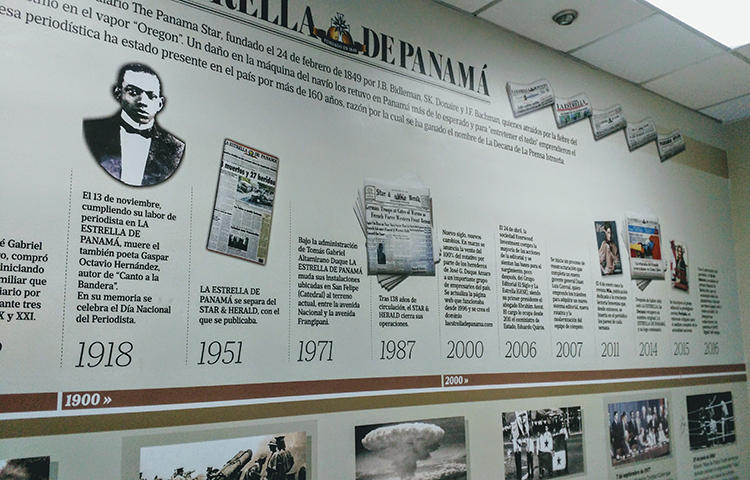La Estrella de Panamá has kept Panama’s citizens informed since 1849. Now, as the country prepares for elections next year, the existence of the major newspaper, along with that of its sister title, El Siglo, may depend on the U.S. Treasury Department.
An operating license that the Treasury Department granted to the daily papers while it investigates their majority shareholder has expired. The license exempted the papers from a ban on U.S. companies doing business with the man who owns them. Without it, the papers are struggling with everything from purchasing ink to maintaining reporting staff.
“It’s a violation of press freedom, freedom of information, everything,” Doris Hubbard-Castillo, La Estrella de Panamá‘s opinion editor, told CPJ. “I’m furious that our journalists have to deal with this uncertainty. The journalists have nothing to do with the investigation, and we’re under all this pressure.”
The licensing issue dates back to May 5, 2016, when the U.S Treasury Department’s Office of Foreign Assets Control (OFAC) added Panamanian businessman Abdul Waked–who owns the titles–his nephew Nidal Waked, and six other people allegedly associated with a money laundering operation to its Specially Designated Nationals list.
The list, created in 1999 under the Foreign Narcotics Kingpin Designation Act, tracks individuals, businesses, and entities that the Treasury Department believes are affiliated with illicit activities related to drug trafficking. Once a person or asset is added to the list, U.S. citizens and companies are barred from doing business with them.
The Treasury Department accused the Wakeds of running a major operation that laundered drug trafficking money through 68 companies. OFAC froze all assets that were within U.S. jurisdiction or controlled by “U.S. persons”–including GESE (Grupo Editorial El Siglo y La Estrella de Panamá), a media group comprising both newspapers and owned by Abdul Waked.
At the time, the Treasury Department granted the media group a license to continue operating, according to a statement published by the U.S. Embassy in Panama.
GESE President Eduardo Quirós told CPJ in an interview at the newspapers’ office in Panama City that he and the staff viewed the license as an acknowledgment of the papers’ importance for press freedom in Panama, and an acknowledgment that the paper’s employees had nothing to do with the business operations of the group’s majority stakeholder.
“We’ve covered the Waked case normally, like we would any other important news story,” Quirós said. He, and two other La Estrella de Panamá journalists who also spoke to CPJ, pointed to numerous articles covering the investigation as evidence of their editorial independence.
In January 2017, the OFAC extended the license to July 13. In an interview with TVN Noticias that week, John Feeley, the U.S. ambassador to Panama, acknowledged that GESE’s employees were not responsible for the situation and said that the U.S. did not want to “destroy” the newspapers. Then, on July 11, La Estrella de Panamá reported that OFAC had informed its lawyers it would not renew the license when it expired later that month, without providing an explanation.
Quirós said that a few days later the media group presented OFAC with a proposal to renew the license, but officials told the group it could not be done until Abdul Waked sold at least 51 percent of his stake in GESE. “They already found a solution with the license, and absolutely nothing has changed since December,” said Quirós.
OFAC did not respond to CPJ’s emailed requests for comment.
Quirós said that the Treasury Department’s decision has created financial and personnel complications for the papers. The newspaper is unable to purchase supplies such as paper and ink, buy replacement parts for its printing press, or pay for health insurance for some employees, because those transactions are processed by banks and financial institutions based in the U.S.
Companies that previously bought advertisements, a major revenue source for the newspapers, have backed off, apparently anxious about any potential association with the case, according to reports. Staff say the financial crunch, combined with the challenges print publications already face in today’s digital media landscape, has led to administrative cutbacks, pay cuts, and layoffs. One week after OFAC’s decision, La Estrella de Panama announced it was halting production of weekend editions to save resources.
Carlos Cordero, who has worked at La Estrella de Panamá for more than six years, estimated that the workforce has fallen from more than 300 employees as of May 2016, to fewer than 230 people at the beginning of August 2017.
The papers’ journalists are worried about the potential effect on public access to information if two of the country’s major newspapers are forced to shut down before national primary elections scheduled for spring 2018.
“If such important media outlets are closed, what’s left?” said Hubbard-Castillo. “When you touch La Estrella, you touch the heart of the country.”
Business and labor leaders, the Chamber of Commerce, the Catholic Church, and politicians–including six former presidents of Panama–have signed on to statements calling for the U.S. government to reconsider its decision, according to news reports.
“At the end of the day, how do you promote democracy by doing such great damage to freedom of expression?” asked Quirós.
